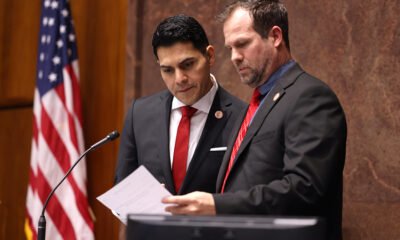Andrew Clyde
Conservative Shift: U.S. House Budget Committee Greenlights GOP Package

WASHINGTON — U.S. House Republicans have advanced a significant reconciliation bill following a narrow vote on Sunday night, overcoming resistance from conservative members. The Budget Committee’s approval came in a tense session that concluded with a 17-16 tally.
Key to the vote was Rep. Lloyd Smucker of Pennsylvania, who switched his stance from “no” to support after leveraging procedural rules for reconsideration. This shift proved instrumental, as four far-right members—Reps. Josh Brecheen, Andrew Clyde, Ralph Norman, and Chip Roy—voted “present,” allowing the bill to proceed despite their earlier opposition.
The proposed legislation aims to reshape federal spending by cutting over $600 billion from Medicaid while extending and expanding the tax cuts from President Donald Trump’s 2017 law, projected to cost $3.8 trillion over the next decade. Notably, disagreements remain on specific provisions, such as work requirements for Medicaid recipients.
After the vote, Rep. Roy indicated his conditional support, citing respect for party leadership but expressing reservations about the bill’s adequacy. Meanwhile, Democrats on the committee raised concerns over transparency, with Ranking Member Brendan Boyle urging clarity on any behind-the-scenes negotiations.
House Speaker Mike Johnson remarked that discussions were progressing well, mentioning “minor modifications” made during the weekend. The bill, which spans 1,116 pages and derives from 11 committees, must now secure approval from the House Committee on Rules before facing a full House vote, amid looming Memorial Day recess plans.
The backdrop of this legislative push included Moody’s Ratings downgrading the U.S. government’s credit rating due to a bleak fiscal outlook. The agency criticized the lack of substantial measures to address ongoing deficits and rising interest costs, foreshadowing potential increases in national debt.
Following the vote, the House Freedom Caucus expressed their discontent, asserting that the bill does not sufficiently reduce deficits and fails to adhere to their stated goals for fiscal responsibility. GOP representatives echoed these sentiments on social media, highlighting the pressing need for fiscal restraint.
As the narrow GOP majority in the House is poised to navigate internal disparities, particularly regarding the SALT deduction, the path ahead remains fraught with challenges, underscoring the complexities of advancing major legislation in the current political climate.


















